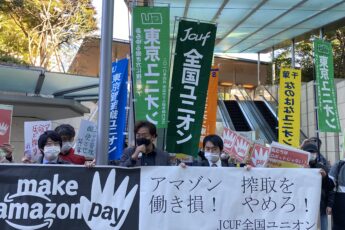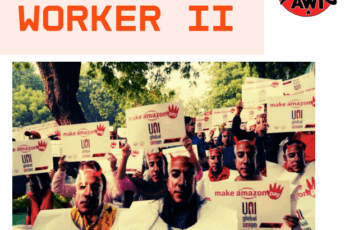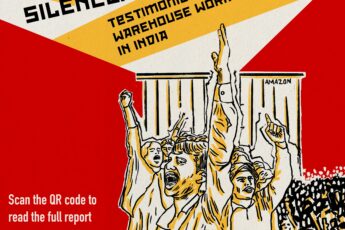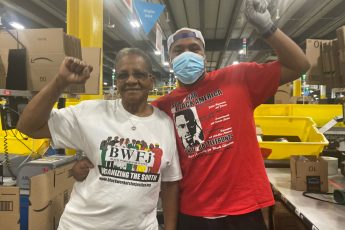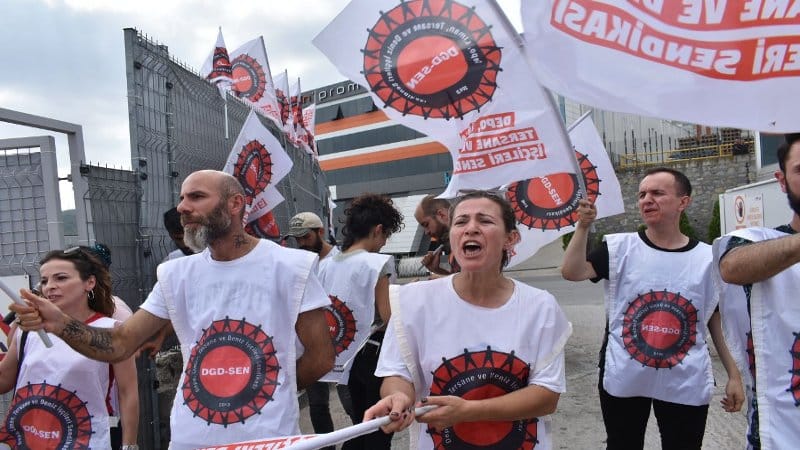
by STREİK SOLİ-BÜNDNİS (Leipzig, Germany)
We publish the English version of an interview realized by Streik Soli-Bündnis Leipzig to three workers of a warehouse in Kocaeli (Turkey) operated by CEVA logistics but working for Amazon. Beginning in August 8, they and their coworkers of the DSG-Sen (an indipendent grassroots union) went on strike for more than a week, picketing in front of the warehouse, organizing inside and collecting signatures from more than 600 workers. By being able to connect a differentiated labor force ‒ made up of students who work to pay university fees, elder men who are often scared to fight since they cannot risk loosing their job, women who are encouraged to strike by the presence of a woman as a union leader – these workers have been able articulate collective claims. First of all, they demand wage increases that could allow them to cope with a skyrocketing inflation rate, which, according to official (and probably underestimated) data, reached 80% in July. The minimum wage recently introduced by the government (5500 TL/300$) is below the poverty line and not remotely sufficient to make a living in this situation. But they also demand an end to the oppressive working conditions in the warehouse, where they are systematically overworked and underpaid, and where repressive practices are constantly employed to prevent them from collectively organizing. The only answer to this from Amazon was that, during the strike in August, the police was repeatedly called to break picket lines and more than 100 workers were fired. Nonetheless, they made clear, the struggle is ongoing within and outside the warehouse. The strike in Kocaeli was part of a broader wave of spontaneous strikes that swept Turkey in early August, not only in the logistics sector but also in several factories throughout the country, where workers made clear their refusal to pay for the increasing cost of life brought by this world-war scenario and that they are ready to fight over wages. At the same time, the strike against Amazon in Kocaeli was immediately connected to the series of wildcat strikes that, for the first time, hit Amazon in the UK in the past weeks against insufficient wage increases in the context of rising prices. From the two very opposite borders of Europe, then, workers are proving that we need to learn to strike again in order to fight this Thirld World War and the violence, exploitation and oppression it brings. But that we also need to connect and enhance all this struggles for wages and for the improvement of all conditions of social reproduction, from Turkey to the UK and beyond. That’s what we will try to do in Sofia from September 8 to 11 at the Transnational Meeting organized by the TSS and LevFem, and in Poznan from September 23 to 25 at the Amazon Workers International meeting.
STREİK SOLİ-BÜNDNİS: To understand to dynamics of your protest, it could be helpful if you tell us about the state of business of Amazon in Turkey. Which role plays Amazon in the Turkish e-commerce-sector?
Worker 1: There is a serious workload and marketing enlargement in Turkey compared to the recent years. Especially for non-clothing purchases, Amazon is becoming the most visited website. Approximately five thousands of people work in the warehouse. Considering cargo, courier and supply management and workers there, you can see Amazon has a huge labour force in Turkey. It is growing steadily in the Turkish market. Especially during sales, we work in the warehouse for up to 12 hours without any break. The Amazon warehouse has a huge influence on other employers, in the way they work. Amazon’s entrance into the Turkish market brought a negative impact on the working environment in warehouses. Their working conditions and environment changed and a lot of rights were revoked.
Worker 2: Amazon is such a big company that spreads the slavery system all over the world, except four countries, Iraq, Syria, North Korea and Cuba where it does not have a business. In Turkey, different companies have just started their transition to e-marketing and they take Amazon as a role model.
Which role does CEVA Logistics, your employer, play in the Amazon network?
Worker 1: CEVA Logistics is a company that has dozens of warehouses throughout Turkey and works with many different companies, and the biggest of these customers is Amazon. Although we are Amazon workers, all our legal procedures are handled by CEVA. There is another subcontractor company called PB – established by the CEVA. That subcontractor also has employees. CEVA is not only leasing its warehouse to Amazon but is now a subcontractor of Amazon.
Worker 2: CEVA Logistics is a company that Amazon uses as a registration desk. It continues business and increases exploitation. Amazon turns a blind eye to all issues since these subcontracting conditions are preparing the ground for Amazon’s future entrance into the Turkey market. This is one of the reasons why Amazon keeps silent.
Worker 3: CEVA plays a supporting role in Amazon’s working environment which is practically based on turning workers into slaves and turning labour exploitation into slave ownership.
What are the main problems of Amazon warehouse-workers in Turkey?
Worker 1: Long working hours, as a start. I travel to the warehouse for 50 km. My travel to work takes 2 hours and I spend 9 hours in the warehouse without compensation for the travel. 11 hours are spent on work. This goes up to 15 hours during the sales times. There is a lot of mobbing. The insults and threats of the managers, combined with tiring work, cause health problems related to mobbing and small work incidents. Wages are very low. A warehouse worker in Turkey receives 305 dollars. Inflation is very high and we can hardly feed ourselves alone with the salaries we receive. It is very hard to pay rent or take care of our families. Too many security measures have been taken in the warehouse. All the workers are constantly under the suspicion of stealing something. We have to go through two X-rays for lunch and break. One time, I had a pen left on me that I used for work, and an X-ray device alarmed me. They wanted to unzip my fleece, and imposed a search, I didn’t let them, but they do this all the time, to the many women workers. We don’t know how much anyone is resisting this imposition. We are almost forbidden to stand side by side with our colleagues and we are warned whenever we have small chat. In my opinion, this is the unhappiest working place in the world. I would never work if I don’t have to.
Worker 2: The basic problem is employees do not have any right to request anything. Not improving conditions, salaries, bonuses, occupational, health, safety measures etc. You just cannot claim any rights and if you do, you need to be prepared for any type of consequences.
Worker 3: Salary is the biggest problem. for example, even if you are there for a very long time, you receive the same salary as a new worker. The raise we received this year due to inflation is much lower than the last one. We are left with the compulsory overtime, the overtime wage is very low and the weekly day-offs, holidays, and bank holidays are all calculated based on the same percentage (50%), which is often underpaid. Mobbing, threats of dismissal, cutting bonuses, unnecessary monitoring and missing payments in food cards, not knowing the place of duty and getting sent here and there like a ping-pong ball and not being allowed to get a promotion, or get expertise in any section are other problems. Even the forklift operator is forced to collect items in the operation. They are just puppet masters and running their show.
In UK, we have seen in the last week also protests in British warehouses in the context of fast growing inflation. Turkish workers have been struggling with inflation since months. How important is the question of wages in Turkish warehouses?
Worker 1: Very important. There is very serious poverty in Turkey. Millions of people cannot eat healthily, cannot afford appropriate houses, and rents are very high compared to wages. In Turkey, in any factory, there are workers on a mass strike for an increase in their wages. We work very long hours in the Amazon warehouse, but the salaries we receive are not even enough for food. Daily and necessary things like going to the hospital, getting treatment, buying books for our children, and drinking a coffee in a cafe are just luxuries for Amazon warehouse workers.
Worker 2: as in every country, the cost of living is the biggest problem. “Get Paid Less, Work More, Afford your life.” In Turkey, we have seen sudden peaks in the prices. Imagine you are working to take care of a family, or household yet your pay is not even sufficient to afford your individual needs. Despite the need for employers to understand the situation that their workers are dealing with, they prefer to use and excuse themselves with the unemployment rate and launch a campaign to continue slavery.
Worker 3: We are forced to get the minimum wage and they act like these wages are given as a blessing and not like the return of our labour. When they gave a raise due to inflation last time, they gave everyone the same amount but they met workers one by one to give the illusion that this raise was personal. They literally make fools of workers. They warned us not to tell anyone about the increase we have received and threatened to terminate the job if we do. As a matter of fact, the raise is just ridiculous. It was also very low last year and this year was even less that the recent one. It just doesn’t come around. We are always trying to catch up with our debt. The warehouse gives credit to the workers and makes them indebted to themselves.
How did the union activities at CEVA start? Did the workers go to the union or was it an organizing project of the union, so that union members started working there to agitate colleagues or union secretaries went to the facilities to advertise union membership?
Worker 1: Our union DGD-SEN has organizations in other departments of the CEVA. There were ongoing meetings and I met them 2 years ago. I went to one of them out of fear. Women are generally afraid to become members of the union, and I was relieved at the meeting to see that the president of the union was also a woman. Then I never severed my ties with the union. Our union is founded by independent warehouse workers, but it is not only interested in the problems of workers in the workplace. No matter what problem we are facing at work or in family, the union is there anytime, early morning or late night. My cousin had a health problem and the union tried very hard to solve it, get an appointment, get treatment and eventually solved it. Even if the Amazon workers are not yet part of DGD-SEN, the union is always there to give support and solidarity, so it is easier to organize propaganda for the workers inside and outside, we are in constant communication.
Worker 2: There were union activities in CEVA before, but once CEVA realized they dismissed 100 workers in a day and hired 150 workers the next day. This kind of change happens anytime when there is union campaigning. They take all kinds of measures to stop union activity.
For more than 2 weeks, workers organised in DGD-SEN have stood in front of the warehouse in Kocaeli, Turkey and protested against Amazon and CEVA Logistics, and the way they have treated the workers. Can you tell us more about the backgrounds of this protest?
Worker 1: At the end of July, the state announced the minimum wage, it was much lower than we expected. All prices rose according to that as well. So we should get a salary of 5500TL but the company pays 3500TL, and the rents are 1000TL at least. We demanded from CEVA administration to have a meeting with workers’ representatives and talked about the problems and wages at the meeting. They said they would solve it, but the next day, the delegation that participated in the meeting was dismissed from work. Afterwards, everyone who wanted a raise started to get kicked out, we know that the reason for the dismissal is because we act together.
For about a year, there were rumors that Amazon would come to Turkey itself. We all knew that there would be layoffs, so union organization has intensified. Warehouse management began to be exiled to warehouses that we could never go without a service. The aim was to disperse the organization. We objected this and found ourselves in front of the doorstep. There is a very serious firing of workers inside, it is illegal, but the state never intervenes. They ignored our complaints. They left us no choice but to resist.
Worker 2: DGD-SEN is carrying out the necessary procedures inside and outside the warehouse, trying to provide legal, financial and moral support. They have been fighting with us at the gates for days. Even when we were a minority, they never hesitated to be our voice to demand our rights. They also tried to help everyone, unionized or not, and gained the trust of the workers. The workers saw themselves stronger and more determined by taking DGD-SEN behind them.
How is the mood in the workforce? How is it possible, that the fired colleagues are protesting for such a long time? Do they receive financial/material support by the union? Are they supported by other people not working for CEVA (e.g. families, people living nearby, workers from other companies)? Has CEVA Logistics shown any reaction to your protest until now?
Worker 1: Those of us who are resisting are in a good mood, but the workers who continue to work inside are restless. Everyone has debts and responsibilities. Uncertainty of not knowing when to get fired creates serious psychological pressure.
Our union is an independent union; it has no income from anywhere. Our union’s president and managers are both warehouse workers. For now, we meet the resistance and our needs with solidarity. The food we eat in the resistance and the vehicles we use for our commute are provided by the people and the unions who are supporting the struggle from outside. We still need a lot of solidarity because our numbers are increasing day by day.
CEVA is aggressively approaching the resistance at the gate. They constantly confront us with soldiers. They pulled a truck to our resistance area and forced us to wait by the side of the road, putting our lives at risk. They even fire those who make an eye contact with us from the services. The guards are constantly making fun of our actions at the gate. They have no respect for our rights.
Worker 2: Workers from the inside are very demoralized, people get fired for no reason or forced to leave. Inside workers are asking if it’s our turn now or are we the victims? The dismissed workers are trying to stand up with the strength they get from the union. Whenever possible, the union also provides support to friends who are experiencing financial difficulties and help finding another job. They do not know many bosses, but they do it by getting support from our fellow workers. When we say support from those who do not work at CEVA, we mean the support of the workers who shared the same fate with us; their congratulations for our determination support us to continue the fight. Apart from that, we have chauffeur brothers who see us from the outside and show their support with their horns, whether there is rain, mud or sun; we want to thank them. CEVA logistics generally shows its reaction by applying pressure and mobbing the workers still working inside.
How strong is the union in the warehouse? How many members do you have? Which percentage of colleagues takes part in the strike? How does your struggle affect the flow of the commodities?
Worker 1: The union is very strong in the warehouse, so there is discomfort in the boss. Workers also establish a bond of affection with the union. Because they immediately show solidarity, if something happens to us or when we demand something. The workers who continue to work while we wait outside are supporting us by slowing down the work. The warehouse has just come out of the campaign, so the actions do not have enough serious effects to create pressure. All of the laid-off workers offer support. But we know that the established Amazon warehouse and CEVA are very uneasy.
Worker 2: The union is actually strong in the warehouse, but our elderly brothers and sisters are worried about not being able to find a job. They are bringing their agents, including workers, inside to suppress the union’s power inside. There are definitely some of their own men in every field. Everything that is spoken, everyone who speaks comes to their table. In particular they are trying to put pressure on these workers and intimidate them. Even though all of my unionized friends want to join, they have to work to make a living. Some of them are trying to finish their work and create opportunities. Even though our number is increasing day by day, sometimes we cannot reach a large number. In this case, by encouraging workers, one-on-one or collectively we keep the supply chain at the door. Workers are aware of their rights and their dismissed friends or livelihood concerns. Employees are given unfounded promises: they have been telling the same stories for three years, saying that they will fix everything in every issue. There were similar stories three years ago. But what they really want is to accelerate the supply. Due to the slowdown, CEVA management is trying to take precautions by employing daily staff.
What are the problems of organizing workers in the Turkish Amazon warehouses?
Worker 1: It is legal for workers to join a union in Turkey, but employers fire them when they find out. And you have to spend three years in court in order to prove it. The state does not control, it takes sides with the bosses. We work very long hours. We have very little chance to meet at our homes; while at home everyone is very tired and mindful of family affairs. The only place we’ll see the workers is inside the warehouse. There is also serious pressure from the managers there. Even during breaks, they don’t want to bring two people together. If you get along with a friend, either your shift or department is changed. Everyone has been promised permanent employment, but despite working for many years, we cannot be permanent staff. This is also used as a threat when we stand out.
Worker 2: Amazon has to prevent worker enslavement, put an end to injustice, and show that inequity and injustice cannot be allowed when they work in Turkey. But for this, the union must be there where Amazon is. Their goal should not be just money from the customer. Amazon should not covet for worker’s money, and workers should be seen as human beings, not slaves. These are our main problems.
Worker 3: Workers are definitely prevented from becoming intimate. When they reach the slightest information about a worker in the union, that worker’s job is terminated immediately. This is sometimes done by arranging false witnesses to not give them any right, sometimes by changing the warehouse they work and by forcing them to resign if they do not accept it, sometimes by giving only a part of their rights or by various games like this. There is a constant circulation of workers, to prevent them from raising awareness and organizing, and not giving them the opportunity to seek their rights.
What could your colleagues or supporters in other parts of the world do to support your struggle?
Worker 1: The struggle in Turkey is just beginning. We are also a part of the Amazon struggle in the world, we know this very well. It is important to share solidarity messages and news about our struggle in order to put them on the agenda of the world. I don’t know much about other countries, but a worldwide public opinion in Turkey leads us to win both against the state and the bosses. The union regularly tells us about the struggles of Amazon workers around the world and tries to connect us with them. I think it’s important to disseminate this. There are millions of resisting workers in the world; we salute all the people who are resisting from Turkey.
Worker 2: They should always keep fighting. Without struggle, no problem resolves by itself. If we, as members of DGD-SEN, are resisting at the factory gate, on social media, in the courts, we stand not only for ourselves but also for workers all over the world. Companies need workers as much as we need jobs. They lose billions of Euros, dollars and TL every day by gambling in the stock markets. Most of these are the money they earn from the workers. They can get what they want, and they can do what they want but we are working to provide for our house and meet the demands of our family under appropriate conditions. They should see us as human beings, not slaves. If we resist, if we unite, this can come true. If the bosses are sleeping comfortably, they are sleeping because we are not together. We need to be able to make them lose their sleep; to be able to say that you cannot sleep comfortably while we are hungry.


